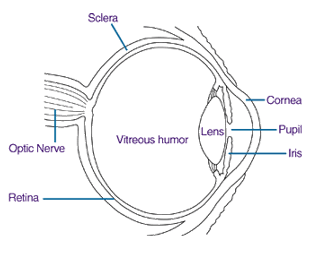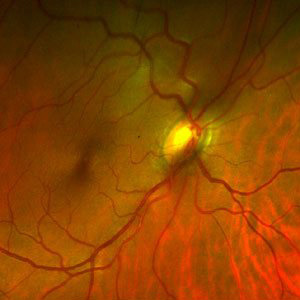|
Glaucoma
What is Glaucoma?
Glaucoma is a group of diseases that can damage the
eye's optic nerve and result in vision loss and
blindness. However, with early treatment you can often
protect your eyes against serious vision loss.
What is the optic nerve?
The optic nerve is a bundle of more than 1 million nerve
fibers. It connects the retina to the brain. (See
diagram below.) The retina is the light-sensitive tissue
at the back of the eye. A healthy optic nerve is
necessary for good vision.

How does open-angle
glaucoma damage the optic nerve?
In the front of the eye is a space called the anterior
chamber. A clear fluid flows continuously in and out of
the chamber and nourishes nearby tissues. The fluid
leaves the chamber at the open angle where the cornea
and iris meet. When the fluid reaches the angle, it
flows through a spongy meshwork, like a drain, and
leaves the eye.
Sometimes, when the fluid reaches the angle, it passes
too slowly through the meshwork drain. As the fluid
builds up, the pressure inside the eye rises to a level
that may damage the optic nerve. When the optic nerve is
damaged from increased pressure, open-angle glaucoma-and
vision loss may result. That's why controlling pressure
inside the eye is important.
Does increased eye pressure mean that I have
glaucoma?
Not necessarily. Increased eye pressure means you are at
risk for glaucoma, but does not mean you have the
disease. A person has glaucoma only if the optic nerve
is damaged. If you have increased eye pressure but no
damage to the optic nerve, you do not have glaucoma.
However, you are at risk. Follow the advice of your eye
care professional.
Can I develop glaucoma if I have increased eye
pressure?
Not necessarily. Not every person with increased eye
pressure will develop glaucoma. Some people can tolerate
higher eye pressure better than others. Also, a certain
level of eye pressure may be high for one person but
normal for another.
Whether you develop glaucoma depends on the level of
pressure your optic nerve can tolerate without being
damaged. This level is different for each person. That's
why a dilated eye exam is very important. It can help
your eye care professional determine what level of eye
pressure is normal for you.
Can I develop glaucoma without an increase in my eye
pressure?
Yes. Glaucoma can develop without increased eye
pressure. This form of glaucoma is called low-tension or
normal-tension glaucoma. It is not as common as
open-angle glaucoma.
Who is at risk for open-angle glaucoma?
Anyone can develop glaucoma. Some people are at higher
risk than others. They include:
African Americans over age 40.
Everyone over age 60, especially Mexican Americans.
People with a family history of glaucoma.
A comprehensive dilated eye exam can reveal more risk
factors, such as high eye pressure, thinness of the
cornea, and abnormal optic nerve anatomy. In some people
with certain combinations of these high-risk factors,
medicines in the form of eye drops reduce the risk of
developing glaucoma by about half.
Click
thumbnails to view full size images
 |
 |
 |
|
Glaucoma OD - advanced |
Glaucoma
OD - atrophy |
Glaucoma OD - mild |
Information also available for
age-related macular
degeneration
and
diabetic retinopathy
Click
Here to shedule an appointment with eye
professional at Teagle Optometry. |